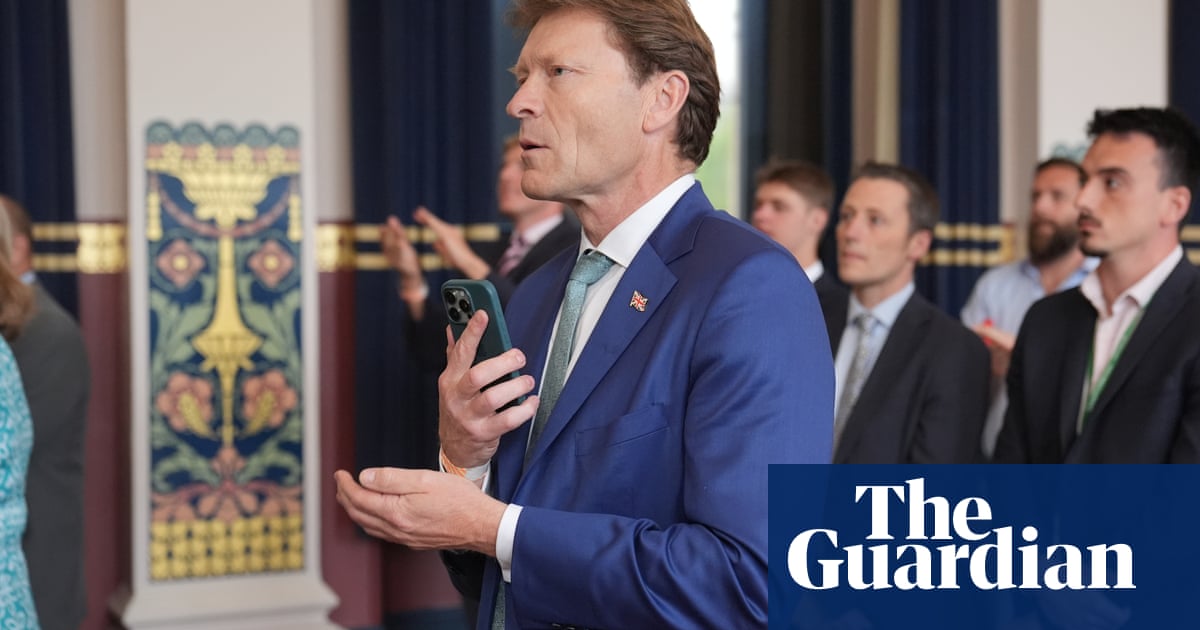Reform UK’s plans to obstruct green energy projects inLincolnshireput at risk almost £1bn in local investment and more than 12,000 jobs, analysis suggests.
No 10 said it would fight any attempt by the party to dismantle or block renewable investment in the area, after its deputy leader, Richard Tice, said Reform-controlled councils and its mayors would be able to block what he called “net stupid zero” infrastructure, including solar farms, pylons and battery storage systems.
In Greater Lincolnshire, net zero industries contribute about £980m to the local economy, accounting for 12,209 jobs,according to analysisby the Energy and Climate Intelligence Unit (ECIU).
Tice said: “We will attack, we will hinder, we will delay, we will obstruct, we will put every hurdle in your way. It’s going to cost you a fortune, and you’re not going to win. So give up and go away.”
The Reform mayor for Lincolnshire, Andrea Jenkyns, as well as the county council, which is also controlled by the rightwing party, would be able to block and delay renewable projects, experts said.
Jenkyns has claimed carbon dioxide is “not pollution”, called for the “ditching” of net zero and declared that Lincolnshire will “not be a dumping ground for pylons”, as well as campaigning against solar farms.
Melanie Onn, theLabourMP for Great Grimsby and Cleethorpes, said: “Reform’s war on the green economy is actually a war on jobs and investment and flies in the face of what hard-working businesses and families need. Reform’s dangerous plan is a threat to British jobs and British workers.
“Now Reform have a platform in Greater Lincolnshire, they must come clean on whether they’re prepared to risk damaging the local economy and risk making thousands of workers unemployed.”
Though larger solar farms over 100MW are classed as nationally significant infrastructure projects (NSIPs) and therefore decided on by Ed Miliband, the energy secretary, anything below that is subject to the Town and Country Planning Act (TCPA) and goes through a local application and approval process.
These can also be “called in” by the secretary of state, but the process of refusal and calling in can add time and expense that smaller projects may not be able to weather.
Battery storage systems, which Tice has also saidReform UKwill block, were taken out of the NSIP programme by the previous Conservative government, meaning they are also subject to the TCPA but can be called in.
However, pylon networks – which are the most controversial infrastructure locally – cannot be stopped by Reform if they are more than 2km long and carry 132,000 volts or more.
Shaun Spiers, the executive director of the thinktank Green Alliance, said: “Of course, any sensible developer will want to win local support for renewable projects, and most work hard to do so. What is really odd is Richard Tice’s apparent determination to drive up energy costs and increase our dependence on imported fossil fuels. That might please Reform UK’s funders, but it’s unlikely to please its voters.”
One possible route for Reform politicians to stop projects such as pylons and large solar farms is through the judicial review process, though the planning and infrastructure bill aims to make the challenges harder.
Sign up toFirst Edition
Our morning email breaks down the key stories of the day, telling you what’s happening and why it matters
after newsletter promotion
Legal challenges can add huge costs to projects, particularly as under the Aarhus convention it is inexpensive for the person or group bringing the court case, and there is no legal cost cover for the project if the applicant loses the case.
Sam Richards, the chief executive of the campaign group Britain Remade, said the judicial review system needed to be overhauled in order to stop vexatious complaints and that the planning bill could allow ministers to go even further. “People in Britain are fed up with the red tape that stops us from getting anything done. The last thing we need is more councils trying to block businesses from building the vital energy infrastructure we need.”
Lincolnshire is the most at risk county in England from environmental damage in the built environment,according to analysis, with Tice representing the seat most at risk of severe floods. Last year, farmland across the county was hit by flooding, resulting in huge losses for farmers. The Met Office says these floods are being made more likely by climate breakdown.
Contrary to what some of the party’s leaders say, most Reform voters do support climate action. The majority support new wind and solar farms and policies to tackle the climate crisis, according to polling this month by the ECIU.
RenewableUK’s executive director of policy, Ana Musat, said: “Any blanket ban on renewables would be costly for bill payers – the ban on onshore wind cost £5.1bn in the financial year before it was lifted – that’s £182 for every UK household.”
Greenpeace UK’s head of politics, Ami McCarthy, said Reform had “peddled lies and weaponised the issue in the area” and there was a risk that smaller developers and community energy projects would be hit particularly hard.
Asked if central government would intervene to help green energy projects get built in Reform-run areas, Keir Starmer’s spokesperson said it would. “We will always be on the side of the builders, not the blockers. We will always be looking at decisions that are going to deliver lower energy bills, higher growth, higher living standards and more jobs around the country. That was the agenda that the government was elected to deliver on.”
